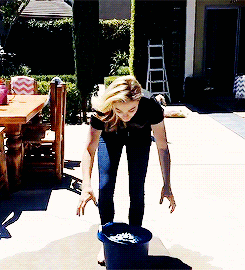
It’s everywhere. People are pouring buckets of ice water over their heads and posting their reactions on social media. Since its climb to popularity, big names such as Justin Timberlake, Facebook CEO and founder; Mark Zuckerberg, as well as comedian Jimmy Kimmel have braved the cold to complete the ALS Ice Bucket Challenge and raise awareness for ALS (amyotrophic lateral sclerosis).
For those who aren’t aware, ALS is one of the five (and the most common) motor neuron disease. It kills nerve cells over a period of time, eventually leaving entire muscle groups paralyzed. This fatal disease kills by stopping nerve activity in vital organs and causing the patient to be unable to breathe or swallow. ALS has no known cause or treatment, and there are as many as 3,000 cases of ALS in Canada. Every day, it is estimated that 2-3 Canadians die due to this devastating disease. Luckily, awareness for this issue has recently reached new heights thanks to an interesting campaign kickstarted by the ALS Association.
The idea of pouring a bucket full of freezing water onto oneself for charity may seem ludicrous, but it might be interesting to know that the it’s been around for a while now. The act became associated with ALS when American golfer Chris Kennedy completed the challenge and passed it onto his cousin, whose husband had been diagnosed with the disease. Eventually, others who were suffering from ALS also took the challenge to promote the cause.
Though the official rules of the Ice Bucket Challenge are in dispute due to the several versions that are out there, they usually state that upon being challenged, you must pour a bucket of ice water over your head within 24 hours and/or donate $100 dollars to an ALS-related charity. What started as a typical fundraising campaign quickly garnered the attention of celebrities all around the world. Thus far, it has raised more than $13.3 million dollars for the ALS Association, making it the most successful campaign in the organization’s history.
However, with success comes criticism, and critics are claiming that the challenge is just an online fad that is more of a social activity than a charitable campaign. Despite the claims that the challenge has become a form of ‘slacktivisim’, it is good to consider the fact that it has raised incredible amounts of awareness for ALS. As well, just by comparing how much money was donated during this time last year ($1.7 million) and this year ($13.3 million), it can definitely be said that the ALS Ice Bucket Challenge has been a charity success.
Here are a few of my favourite challenges:
For more information about ALS, or to get involved, visit alsa.org


